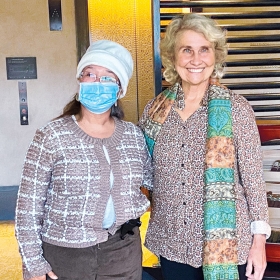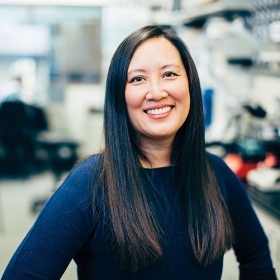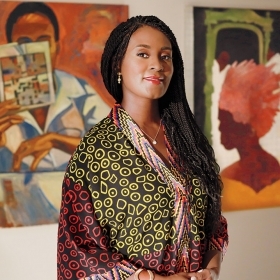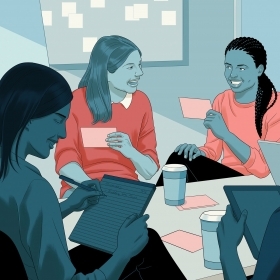Lisa Stith Jones ’78 / Fran Philips Decker ’80
“We are born with two kidneys, and we only need one to live. Perhaps God gave us two so that we could help someone else who may need one.”

Lisa Stith Jones ’78 (left) and Fran Philips Decker ’80 meeting for the first time.
With a family history of chronic kidney disease, Lisa Stith Jones ’78 pressed her internist for further testing following a routine physical. To ease her mind, he referred her to a nephrologist. Her diagnosis—stage 3 chronic kidney disease. “I asked, ‘How many stages are there?’” Lisa recalls. “He said there are five stages. The fifth stage is end-stage renal disease.”
Lisa’s physicians said she would be an excellent candidate for a kidney transplant, and through her transplant education class, she was encouraged to tap into her various networks to reach the broadest audience possible when looking for a living donor. Lisa’s daughter posted on Twitter about her mom’s need for a kidney transplant, receiving thousands of views. Lisa also posted on her Facebook page, sharing her family history with the disease and contact information for the Johns Hopkins Comprehensive Transplant Center. But it was the repost on the Wellesley Progressions Facebook page by Melanie Payne ’80, a friend of Lisa’s, that got the attention of Fran Philips Decker ’80.
Fran, who lost her husband to cancer in 2015, remembers how it feels when a loved one is seriously ill. “You would do anything to save that person,” Fran says. “And I thought, here’s a Wellesley alum, and our motto is to serve.”
Fran, who lives in Key West, Fla., said she had considered kidney donation before—“in the abstract”—but thought at age 61, she was now too old. She emailed Johns Hopkins to find out and filled out their online donor questionnaire. She instant-messaged Lisa on Facebook that same day requesting additional information.
Fran discovered there were other alums who had donated a kidney before, and she spent hours talking with one of them. She went into research mode, consulted with family and friends, and underwent initial testing. She even worked out with a personal trainer, wanting to be in the best shape possible for the very thorough medical evaluation necessary to be a living donor.
She let Lisa know she was coming to Baltimore to have some testing at Johns Hopkins. “I thought they’d probably find something wrong, but every test came back that I was completely healthy,” Fran says. Lisa felt optimistic. “I thought, ‘This is it.’”
Fran, however, was not a match for Lisa, even though they shared the same blood type. Lisa had some antibodies against Fran’s kidney, which meant that her body would fight against it. In such cases, paired kidney exchange is an option, in which both the donor and recipient may choose to enter an exchange with other incompatible donor-recipient pairs. “I didn’t hesitate,” Fran says. “I thought, ‘Does it really matter who gets my kidney?’ And Lisa will get a kidney that’s a better match for her.” Lisa indeed found a match and had her kidney transplant in December 2019 at Johns Hopkins Medical Institute; Fran’s surgery followed in January.
Although their time at Wellesley overlapped, Fran and Lisa never met in person until Lisa and her husband visited Fran following her surgery in the Baltimore area. “We had a lovely meeting,” Fran says. And what did the two talk about? “Wellesley, of course!” That’s when they found out they were both biology majors and lived in Tower Court.
Scheduled to return to work this spring, Lisa, 64, reflected on this journey. She calls Fran her “shero.” “We are born with two kidneys, and we only need one to live,” Lisa says. “Perhaps God gave us two so that we could help someone else who may need one.”


